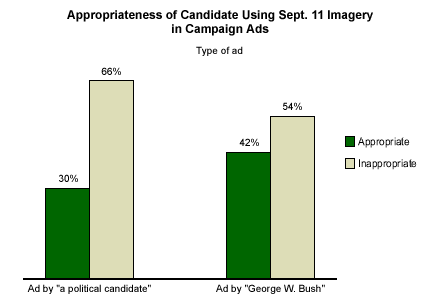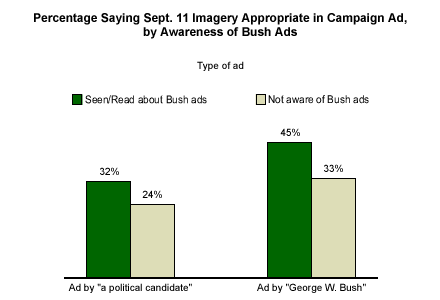With the Democratic presidential nomination now all but decided, the general election campaign is getting underway in earnest. The two likely major-party candidates have already engaged in verbal sparring, and President George W. Bush's campaign has begun airing ads in selected television markets. Bush's National Guard service, likely Democratic nominee John Kerry's alleged "flip-flopping" on issues, and the Bush campaign's use of Sept. 11 imagery in commercials have already caused controversy. The most recent CNN/USA Today/Gallup poll measured public reaction to some of these early controversies.
At the time the poll was conducted (March 5-7), relatively few Americans thought the campaigns had been unfair to their opponents. The poll finds 21% of Americans saying Bush and the Republican Party have attacked Kerry unfairly, while 67% say they have not. But more Americans, 35%, believe Kerry and the Democratic Party have attacked Bush unfairly. Fifty-seven percent disagree. This is the case even though Kerry leads Bush in Gallup's latest presidential election trial heat.
The results are predictably partisan with more Democrats than Republicans thinking Kerry has been attacked unfairly and more Republicans than Democrats thinking Bush has been attacked unfairly. The difference in the overall results is due to the fact that most Republicans, 59%, believe the Kerry campaign has unfairly attacked Bush, while only 33% of Democrats believe the Bush campaign has unfairly attacked Kerry.

Bush Campaign Ads
One specific criticism levied against Bush concerns the appropriateness of the campaign's use of images of the Sept. 11 terrorist attacks in its commercials. Some survivors of Sept. 11 victims have charged the Bush campaign with exploiting the tragedy for political gain. Most Americans seem to agree with this assertion.
Thirty percent of Americans think it is appropriate for political candidates to run campaign ads depicting the Sept. 11 terrorist attacks, while 66% say it is inappropriate.

When a separate question was asked specifically about Bush's use of Sept. 11 in his advertising, a slightly higher percentage, 42%, say it is appropriate for him to use such imagery, while 54% say it is inappropriate**.
Democrats are pretty consistent in their views on the matter, whether it is framed in terms of Bush or a generic candidate. Only about 12% of Democrats believe it is appropriate for Bush or the generic candidate to use Sept. 11 imagery. Republicans show a slight bias in favor of Bush -- 74% say it is appropriate for him to use the ads, 56% say it is appropriate for a political candidate to do so -- but in both cases, Republicans tend to be comfortable with the practice.
The poll finds that most Americans were familiar with Bush's campaign ads, though the question did not mention anything about the controversial ads featuring scenes of the terrorist attacks. Thirty-one percent of Americans had seen Bush campaign ads by the time they were interviewed, 39% had heard or read about them, and 29% were not aware of the ads. The ads are currently being run in key battleground states, and repeated on various television news shows.
The data show that those who had seen Bush campaign ads were somewhat more likely to say that using Sept. 11 imagery is acceptable for a political candidate (or Bush) to do.
Specifically, 32% of Americans who had seen or heard about the ads say it is appropriate for a candidate to use 9/11 images, compared with 24% who were not aware of the Bush ads. Additionally, 45% who had seen or heard about Bush's campaign ads say it is appropriate for him to use the images, compared with 33% who were not aware of the ads.

The differences due to ad awareness cannot solely be explained on the basis of partisanship, as Republicans (78%) are only slightly more likely than Democrats (72%) to report seeing, hearing, or reading about new Bush ads.
Bottom Line
Gallup will continue to monitor the public's views on the tones of the campaigns -- which will likely become more negative over time -- and the extent to which Americans feel both candidates are being attacked unfairly. Additionally, polling also allows for a test of the extent to which the campaigns' messages are resonating with the public. For example, the new poll shows that at this early stage, Americans are more likely to believe that Kerry (49%) rather than Bush (37%) is more likely to change his position on issues for political reasons. This is a charge the Bush campaign will continue to make against Kerry. Kerry surely will attempt to make Americans feel that Bush has done a poor job on the economy and on the situation in Iraq. Gallup's most recent data on these topics suggest that more Americans disapprove than approve of Bush's handling of these issues. Changes in measures such as these show whether the campaigns' messages are getting through to the voters.
*Results are based on 1,005 national adults, age 18 and older, conducted March 5-7, 2004. For results based on this sample, one can say with 95% confidence that the maximum margin of error attributable to sampling is ±3 percentage points.
**Results based on the 503 national adults in the Form A half-sample and 502 national adults in the Form B half-sample have maximum margins of sampling error of ±5 percentage points.
